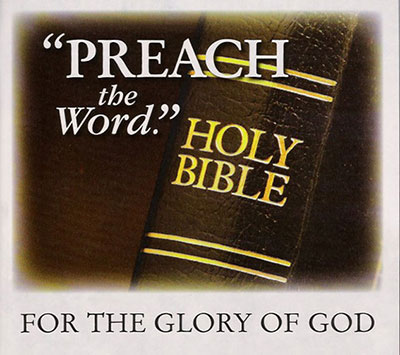THE FIRST CHRISTIAN PREACHING
Acts 2:14-42...the account of the first Christian Sermon ever preached.
In the early Church there were four (4) different kinds of preaching:
- Kerugma = herald's announcement and is the plain statement of the facts of the Christian message...there was no argument or doubt.
- Didache = means teaching and made clear the meaning of the facts which had been proclaimed.
- Paraklesis = means exhortation. This kind of preaching urged upon men the duty of fitting their lives to match the kerugma and didache (facts) which had been given.
- Homilia = means the treatment of any subject or department of life in light of the Christian message.
Put simple, there is the plain proclamation of the facts of the Christian gospel;
the explanation of the meaning and the relevance of these facts; the exhortation to fit life to them; and the treatment of all the activities of life in the light of the Christian message.
Acts includes mainly the preaching style...kerugma, because Acts tells of the proclamation of the facts of the gospel to those who had never heard them before.
Kerugma follows a pattern in the New Testament:
- There is the proof the Jesus and all that happened to him is the fulfillment of Old Testament prophecy. In modern times less and less stress has been laid on the fulfillment of prophecy. We have come to see that the prophets were not nearly so much fore-tellers of events to come as forth-tellers of God's truth to men. The early preaching conserved the great truth that history is not haphazard and that there is meaning to it. To believe in the possibility of prophesy is to believe that God is in control and that He is working out His purposes.
- In Jesus the Messiah has come, the Messianic prophecies are fulfilled and the New Age has dawned. The early Church had a tremendous sense that Jesus was the hinge of all history; that with His coming, eternity had invaded time; and that, therefore, life and the world could never be the same again.
- Jesus had been born of the line of David, that He had taught, that He had worked miracles, that He had been crucified, that He had been raised from the dead and that He was now at the right hand of God. And, the early Church believed that life and death were not the end and that after them came the resurrection. That Jesus was not just someone of whom they had heard and read about; He was someone they met and knew...a living presence.
- Insisted that Jesus would return in glory to establish His kingdom upon earth. They believed intensely in the Second Coming...that history is going somewhere and that some day there will be consummation; and that man is therefore in the way or on the way.
- In Jesus alone was salvation...that by believing on Him all people could receive the Holy Spirit...and that he who does not believe was destined for terrible things. Preaching in those days ended with both a promise and a threat....
Peter's sermon had the above 5 threads woven into it.
The question is not whether the people believed what Peter preached then, but if people believe the truth of the Word that is preached today.
The test of true preaching...Does it have the Holy Spirit's approval in that He (the Holy Spirit) feels welcomed and open for commitment by the hearers (listeners) of His Word?
People and preachers make mistakes, but the Holy Spirit never makes mistakes.
Be open to His presence today!
